Blessed Martyrs of Niepokalanów
Ludwik Bartosik
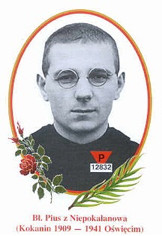
Ludwik Bartosik was born on August 21, 1909, at Kokanin, near Kalisz. He was the firstborn of Wojciech, shoemaker, and Wiktoria Tomczyk. His parents were very poor. Thanks to the efforts of the family, of their acquaintances and of the parish priest of the village, the young Ludwik was so well intellectually prepared that he could begin his studies in the gymnasium “Tadeusz Kosciuszko” of Kalisz, where he attended classes.
In 1926 he was accepted in the Conventual Franciscan Order. He began his novitiate on September 7, 1926, at Kalwaria Paclawska, receiving the name Pius. On September 8, 1927, he pronounced his temporary vows. He started his studies again in the Franciscan minor seminary, at first at Sanok and then in Lwow (now Lviv, Ukraine), crowning them in 1931 with a diploma. Afterward, he began to study philosophy and theology in the major seminary of Krakow, where the Bishop Stanislaw Rospond ordained him a priest on June 23, 1935.
His first destination was the friary of Krosno, where he distinguished himself for his devotion and especially for his dedicated ministry in the confessional. In August 1936 he was transferred to Niepokalanów, by explicit request of Fr. Maximilian Kolbe, just elected guardian of that friary, after six years of mission in Japan. Perceiving in Father Pius a lot of spiritual and intellectual qualities, Father Kolbe entrusted him with many tasks of responsibility, appointing him editor of the monthly magazines Rycerz Niepokalanej (The Knight of the Immaculata, 1936-39), Rycerzyk Niepokalanej (The Little Knight of the Immaculata, 1937- 38) and the quarterly review in Latin Miles Immaculatae (1938-39). Father Bartosik wrote many articles and a book with a Marian theme, which remain in print. The friars remember Father Pius as a thoughtful priest, who spent a lot of time in the confessional, and treated his collaborators with extraordinary kindness and respect.
Martyrdom
On September 19, 1939, the Germans arrested him together with St. Maximilian Kolbe and about forty confreres, and he spent nearly three months in the prison camps of Lamsdorf, Amtitz, and Ostrzeszow. He patiently bore hunger and sufferings, repeating: “Until now we wrote and told others how to bear suffering, now it is our turn to experience all this, otherwise what value could our words have?”
On February 17, 1941, he was arrested for the second time, together with Fr. Maximilian Kolbe, Fr. Antonin Bajewski and other two friars, and taken to Warsaw in the Pawiak prison, where he patiently bore every mistreatment. During Holy Week, on April 4, 1941, he was transported with Father Antonin to Auschwitz, where he was registered with the number 12832. At the beginning, he was assigned to building works. Afterward, because of his bodily breakdown, a skin infection and a painful injury to the leg, he was sent to the hospital of the “lager.” There, with extreme dedication, he helped the other patients, cleaned their wounds, assisted them both bodily and spiritually, above all with the sacrament of Penance. He repeated: “The sufferings of this moment can’t be compared with the future glory, with the future happiness that we are going to have near God, in Heaven.”
Father Pius, notwithstanding his severe sufferings, patiently bore the situation that he was compelled to undergo. He died, after receiving Extreme Unction by Fr. Konrad Szweda, in the night between the 12th and 13th of December, 1941. “So died the editor of the Rycerz Niepokalanej, of the Rycerzyk Niepokalanej and of the Miles Immaculatae, a knight of the Immaculata and an authentic apostle of suffering, as he was called in the concentration camp. He got through the most terrible torments with heroic patience, following the example of the divine Master Jesus Christ, crucified for our salvation. ‘Blessed are they that suffer, for theirs is the kingdom of Heaven!’” With these words, ends the testimony of Fr. Konrad Szweda, ex-prisoner of Auschwitz and Dachau.
Father Pius was proclaimed “blessed” by Pope John Paul II on June 13, 1999.
Jan Eugeniusz
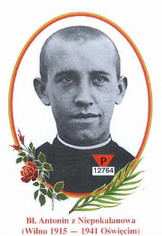
Jan Eugeniusz was born at Vilnius on January 17, 1915, the only child of Jan and Aniela Wilkowska. His parents were well-to-do. He was baptized on March 14, 1918, in the parish church of the Holy Spirit, at Vilnius.
After the middle school certificate, he continued his studies, at first in the royal gymnasium J. Lelewel and then in the classical gymnasium A. Mickiewicz, also in Vilnius. He was a very gifted person. He could speak fluently several languages. On June 16, 1933, he obtained a diploma and decided to consecrate himself to God, in spite of his family’s resistance. This is what he wrote about that period of his life: “In 1933, after the school diploma, I was faced with a dilemma: to become a friar or a diocesan priest. As some of my classmates came from the diocesan seminary, and I often went to visit them, I opted for the second solution even if in my heart I was more inclined to a religious Order.” So he began to study in the major seminary of the Diocese of Vilnius. However, his vocation for the religious life was so strong that, after one year of studies, he left the diocesan seminary and entered the Conventual Franciscan Order. He was accepted in the Polish Province on August 17, 1934, and on September 1st of the same year he received the Franciscan habit and the name Antonin. He spent his novitiate in Niepokalanów, where he pronounced the temporary vows on September 2, 1935. Afterward, he started again to study theology in the Franciscan seminary of Krakow. He crowned his religious formation with perpetual profession on November 1, 1938, and priestly ordination on May 1, 1939. His first destination was Niepokalanów, where he arrived on July 2, 1939. Very soon the guardian of the friary, Fr. Maximilian Kolbe, chose him as his second substitute, that is, the second vicar of the friary.
The brethren of his community remember Fr. Antonin Bajewski as a generous priest, who distinguished himself for his deep faith, devotion, spirit of prayer and gentleness toward others. Because of his weak health, Father Antonin spent the first months after his arrival in Niepokalanów in the nursing home, called “Lasek,” a couple of kilometers from the friary. Here, he was staying at the outbreak of the Second World War, on September 1, 1939. When the Germans, on September 19th, arrested and deported almost all the friars who remained in the friary of Niepokalanów, those who resided in the “Lasek,” including Father Antonin, avoided the imprisonment.
Martyrdom
However, later he could not avoid the arrest. On February 17, 1941, the Gestapo arrested him, together with Father Maximilian, Fr. Pius Bartosik and other two friars from Niepokalanów, and he was detained in the Pawiak prison, in Warsaw. During his stay in that prison, Father Antonin encouraged his fellow prisoners, showing great patience, inviting them to behave correctly and offering them his rations of food. While in prison, he continued to wear the Franciscan habit, although it was the cause of additional ill treatment by the SS. In the night between the 4th and 5th of April 1941, he was transported with Father Pius to Auschwitz, where he was tattooed with the number 12764. When he arrived in the “lager,” he was brutally beaten by the SS with the Franciscan rosary he wore on his side.
Besides these mistreatments, Father Antonin suffered because he became ill with abdominal typhus. In spite of his disease, he devoted himself to the patients of the “lager,” as the good Samaritan, giving them bodily and spiritual help, above all through the sacrament of Confession, seriously risking his life. He patiently bore the sufferings of life in the “lager,” often repeating: “I’m nailed to the cross together with Christ.”
Exhausted by hard labor, Father Antonin died in Auschwitz on May 8, 1941, on the day dedicated to the martyr St. Stanislaus. Before his death, he said to Fr. Konrad Szweda, who had heard his last confession, “Tell my brethren of Niepokalanów that I died here, faithful to Christ and Mary.” He died with the names of Jesus and Mary on his lips.
Father Antonin was proclaimed “blessed” by Pope John Paul II on June 13, 1999.
Piotr Zukowski
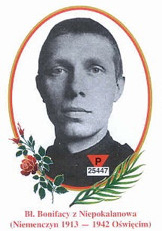
Piotr Zukowski was born on January 13, 1913, at Baran-Rapa, a village populated by the lower middle class, in the parish of Niemenczyn, in the province of Vilnius. The son of Andrzej and Albina Walkiewicz. After the first four years of primary school at Rudowiek, he stayed at home to help his parents in the farm work. When he was sixteen, he entered the Conventual Franciscan Order in Niepokalanów, where he arrived on September 9, 1930. He began his novitiate on June 14, 1931, and he pronounced his temporary vows on July 16, 1932, receiving the name Bonifacy. On August 2, 1935, he made his perpetual profession. Before it, the then-guardian of the friary, Father Florian Koziura, wrote in his report: “A good person from every point of view. I wish there were others like him!”
Friar Bonifacy spent his whole religious life in Niepokalanów, carrying out many tasks of responsibility in the printing works, devoting himself in this way to the apostolate of the printed word. He was quiet, serene, a well-balanced friar.
After the outbreak of the war, he remained in the friary and he safely put away the typographical machines, seriously running the risk of losing his life. He was a brave person and sometimes he showed it, in his conversations with the German occupants.
Martyrdom
On October 14, 1941, he was arrested by the Gestapo, together with other six friars, including Friar Tymoteusz Trojanowski, and shut up in the Pawiak prison in Warsaw. During the imprisonment, he often said the Rosary and in the evening, with the other friars, he sang religious hymns. Talking with the other prisoners, he spiritually comforted them. He shared with his fellow prisoners, the food he received from the outside.
On January 8, 1942, he was transported with Friar Tymoteusz to the concentration camp of Auschwitz, where he was registered with the number 25447. He was assigned to the transport of building materials (“Bauhofkommando”), the transport of gravel, the demolition of the crumbling buildings of Auschwitz (“Abruchkommando”), the roof maintenance staff and, finally, to the harvest of oil seed. He tried to bear his sufferings with courage and spirit of faith. Once he was beaten with a piece of wood until he bled.
The labor in the cold gave rise to pneumonia. He died on April 10, 1942, after spending two weeks in the hospital of the lager (barrack).
Proclaimed “blessed” by John Paul II on June 13, 1999.
Stanislaw Antoni Trojanowski
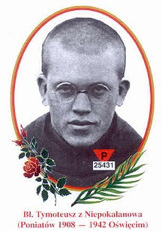
Stanislaw Antoni Trojanowski was born on July 29, 1908, in the village of Sadlowo, parish of Poniatow, dioceses of Plock; son of Ignacy and Franciszka Zebkiewicz. He was compelled by their financial difficulties to work from his earliest youth to support his family. For this reason, he attended only three years of primary school. On March 5, 1930, he was accepted as a candidate to the Franciscan life in the friary of the Conventual Franciscan Friars of Niepokalanów and, on January 6, 1931, he began his novitiate, receiving the name Tymoteusz. He pronounced his temporary vows on February 2, 1932 and the perpetual ones on February 11, 1935.
He spent his whole religious life in Niepokalanów, mostly working in the posting department of the Rycerz Niepokalanej (Knight of the Immaculata), in the supplies storehouse and in the infirmary, where he did his utmost to help the ill friars. On May 3, 1937, he expressed to his superior his willingness to go in mission “everywhere and in every moment, at God’s disposal.”
He was a well-disciplined friar, faithful to his Franciscan vocation, and the superior of the friary, Father Maximilian Kolbe, completely trusted him.
Martyrdom
After the outbreak of the Second World War, at the beginning of September 1939, he decided to remain in Niepokalanów. On October 14, 1941, he was arrested by the Gestapo together with other six friars, including friar Bonifacy Lukowski, and shut up in the Pawiak prison in Warsaw. During the imprisonment, he prayed a lot, he infused courage into the others and he was always the first to undertake to do various servile tasks.
On January 8, 1942, he was transported with Friar Bonifacy to the concentration camp of Auschwitz, where he was registered with the number 25431. He was assigned to the transport of building materials in the “Bauhof” department, then to the digging and the transport of gravel in the “Kiesgruppe” department and, finally, to the harvest of oil seed.
He bore with courage the hunger the cold and the hard labor. He didn’t lose heart; he even encouraged his fellow prisoners and exhorted them to have confidence in divine protection. Because of the cold he became ill with pneumonia and he died in the hospital of the lager (barrack) on July 28, 1942.
Proclaimed “blessed” by John Paul II on June 13, 1999.
Jozef Wojciech Guz
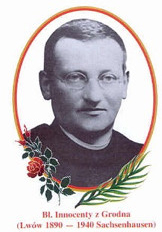
Jozef Wojciech Guz was born on March 18, 1890, in Lwow (now Lviv, Ukraine). After attending the primary school and the gymnasium in his hometown, he wanted to enter the Company of Jesus, but he wasn’t accepted because his financial situation wasn’t enough good. So he decided to become a Franciscan.
On August 25th, 1908, he put on the Franciscan habit, receiving the name Innocenty. At the end of the year of novitiate, on August 26, 1909, he pronounced his temporary vows in Lviv. Afterwards, he began to study philosophy and theology in Krakow and, when he finished studying, he was ordained priest (June 2, 1914).
He practiced his sacred ministry at Hanaczow, Czylki, Halicz, Warsaw, Lviv and Radomsko, but his longest stay was in Grodno. Here, he met Saint Maximilian Kolbe, who in the years 1922-27 published, in that friary, the Rycerz Niepokalanej (Knight of the Immaculata). In the years 1933-36 he stayed in Niepokalanów, where he practiced the ministry of confessor for the numerous brethren of that friary; moreover, he was the vice-teacher of the seminarians and singing-master in the missionary minor seminary. In 1936 he was moved again to Grodno, where he was caught in the Second World War and the Russian occupation.
Martyrdom
On March 21, 1940, he was arrested by the Soviet authorities and shut up in the prison of Grodno, from which he succeeded to escape. Crossing the Russian-German frontier, he was captured by the Germans and taken at first to the prison of Suwalki and then on April 20 he was taken to the prison of Dzialdowo. On May 8, he was transported to the concentration camp of Sachsenhausen, near Oranienburg. On May 29, as reported by a priest, Fr. Stanislaw Borowczyk, “All the priests and the Jews were put together and for one week they were subjected to inhumane exercises. Father Innocenty had several fractures. On June 6th, when our section moved to reach our place of work, he wasn’t able to keep in step with the others because his leg was so swollen. For this reason he was taken out of the group and, together with Fr. Czapczyk of Warsaw, he was beaten up, kicked and compelled to reach the section, jumping with his legs bent. Here, the guard of the dormitory, Fritz, took both of them to the bathroom and began to throw cold water at them. After a while, he pushed the priest into a basin full of water, he poked a rubber hose in his mouth and, in this way, he killed him.” At the point of death, Father Innocenty spoke to the friend who was beside him: “I go to the Immaculata. You remain here and do what you have to do.” Fr. Borowczyk, his fellow prisoner at Sachsenhausen, says: “Father Guz spent the last period of his life as a real martyr and I think that we should pray not for his soul, but in order to obtain his help.”
Proclaimed “blessed” by John Paul II on June 13, 1999.
